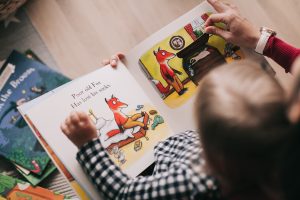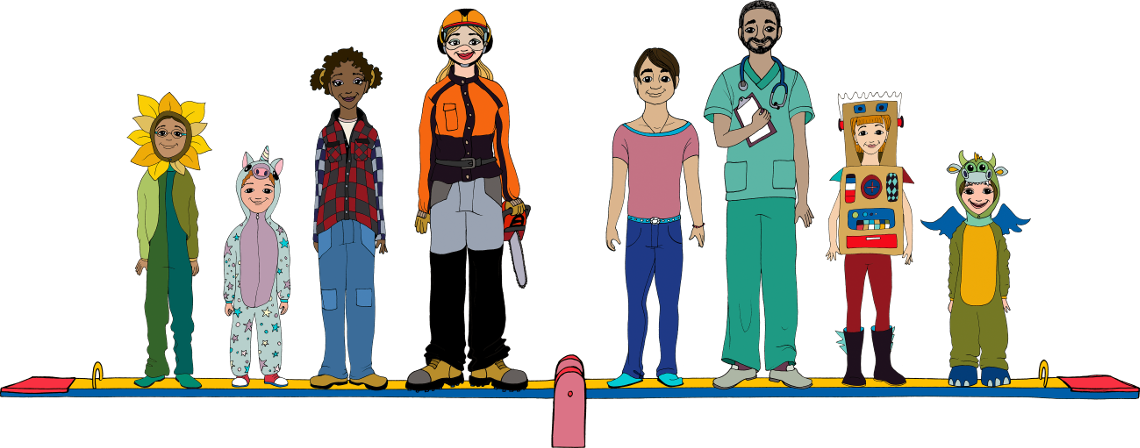Goals

Brief description of the issue
Boys’ difficulties in reading and writing skills are one factor that is linked to their school dropout rate, which is higher than girls’ (Boyer, 2009). Because of their socialization, not naturally, boys fall behind in reading compared to girls and are less motivated to read (Lavoie, 2011). To minimize this gap, we must develop, with boys and girls, an appreciation for reading starting in early childhood and break down stereotypes stating that reading is an essentially female activity. Yet, a lot of books showcase very stereotypical stories and characters that reinforce these beliefs. Children’s books might also have a role to play in the underrepresentation of women in science (Wilbraham & Caldwell, 2018). A well-picked book, both from the point of view of tackling gender stereotypes and as regards to its content, which must also be a topic of interest for boys, can help children develop a critical look as well as daily reading habits. Good reading skills as well as a low buy-in of gender stereotypes are effectively correlated with school success and retention, boys and girls alike (Réseau Réussite Montréal, 2018).
Choosing a book free from gender stereotypes
Children’s books carry along many gender stereotypes. It is, among others, through these stories and the representations of men and women they offer that children build their own gender identity (SCF, 2018). In order to limit young children’s buy-in of gender stereotypes, it is important to offer them books that break down those stereotypes instead of reinforcing them.
To guide you through your choice of books that are free of gender stereotypes, use this gender-equal book assessment grid. It holds a few questions to ask yourself when you look at characters, illustrations and roles represented in a book. This great blog post can also help you assess books you already have or that you are planning to purchase.
Here are a few suggestions of books encouraging children to have a gender-equal representation of the world:
- Twelve Books for Feminist Boys and Girls
- Five Children’s books that promote gender equality
- Ten of the best picture books to promote gender equality and identity
- 20 Children’s Books That Redefine Gender Roles
- Books about sexual and gender diversity
- 14 Children’s Books that Challenge Gender Stereotypes
- 2019 Amelia Bloomer List
Finally, as reading is still considered today as a feminine activity and that, consequently, the literary offer is still very focused on female readers (and traditionally female interests), it is important to choose books that draw boys’ interests to hook them up with a subject they like, and then bring them to diversify their reading choices gradually.
How to use a gender-equal book?
There are a multitude of gender-equal books tackling gender stereotypes in various ways. Here are a few recommendations of books with reflection questions to facilitate a conversation with children.
Themes: assertiveness, autonomy, self-confidence, gender stereotypes
Reflection questions:
- How was the princess able to beat the dragon?
- Was the prince happy to be saved by the princess? Why?
- If you would have been the princess, would you have done the same thing? Why?
- Is the way we look more important than what we do? Why?
Themes: assertiveness, autonomy, choices
Reflection questions:
- Are there colors associated with things or people in particular? Why?
- What are your favourite colors and why?
- If you had to draw a truck, what color would you use? Why?
- If you had to draw a flower, what color would you use? Why?
Themes: gender equality, gender stereotypes, gender roles
Reflection questions:
- Have you ever played with dolls? Why? Why do you like it?
- Have you ever been told you couldn’t play with a toy you like because of your gender? How did it feel?
- Have you ever heard or seen someone making fun of another kid because of his or her choice of toys? How should we react in these situations? What should we say or do?
How to challenge gender stereotypes when we are reading a “traditional” book?
Trying to deconstruct and uncover gender stereotypes in an early childhood educational setting doesn’t imply removing all books portraying stereotypical representations of boys and girls, nor does it require using only books of which the primary goal is to tackle gender stereotypes. It can be interesting, educational and helpful in terms of critical thinking to keep some of these books to read them with children and ask them questions about the story, such as:
- What is the boy/girl doing in the story? Could we switch their roles? Why? (For example, in the traditional fairy tale, could the princess fight the dragon and free the prince?)
- What is this mom/dad doing? Could they switch roles? How does it work for you at home?
- This boy/girl character works as a [traditional job for gender]. Do you know boys/girls doing this job? For example, do you know female firefighters or male nurses?
- Let’s retell the story while switching roles or changing the lines!
References
BOYER, Marie-Christine (2009). La lecture et l’écriture chez les garçons… de A à Z. Ministère de l’Éducation, du Loisir et du Sport, Québec, 33 pages. Accessible at: http://www.education.gouv.qc.ca/fileadmin/site_web/documents/PSG/statistiques_info_decisionnelle/LaLectureEtLEcritureChezLesGarcons_DeAaZ.pdf
LAVOIE, Natalie (2011). “Les garçons aussi aiment lire”, Québec français, (162), pp. 49-50.
GUERRY, Linda et WILLIAMS, Nastassia (2018). Persévérer dans l’égalité – Guide sur l’égalité filles-garçons et la persévérance scolaire, Réseau Réussite Montréal et Complice – Persévérance scolaire Gaspésie-Les Îles, accessible at : http://www.reseaureussitemontreal.ca/perseverer-dans-legalite/
SECRÉTARIAT À LA CONDITION FÉMININE (2018). Portail Sans Stéréotypes, Gouvernement du Québec, accessible at: http://www.scf.gouv.qc.ca/sansstereotypes/quest-ce-quun-stereotype/
WILBRAHAM, Susan & CALDWELL, Elizabeth (2018). “Children’s books are having a worrying effect on gender equality in science”, World Economic Forum, August 30, 2018, accessible at: https://www.weforum.org/agenda/2018/08/childrens-books-are-having-a-worrying-effect-on-gender-equity-in-science
